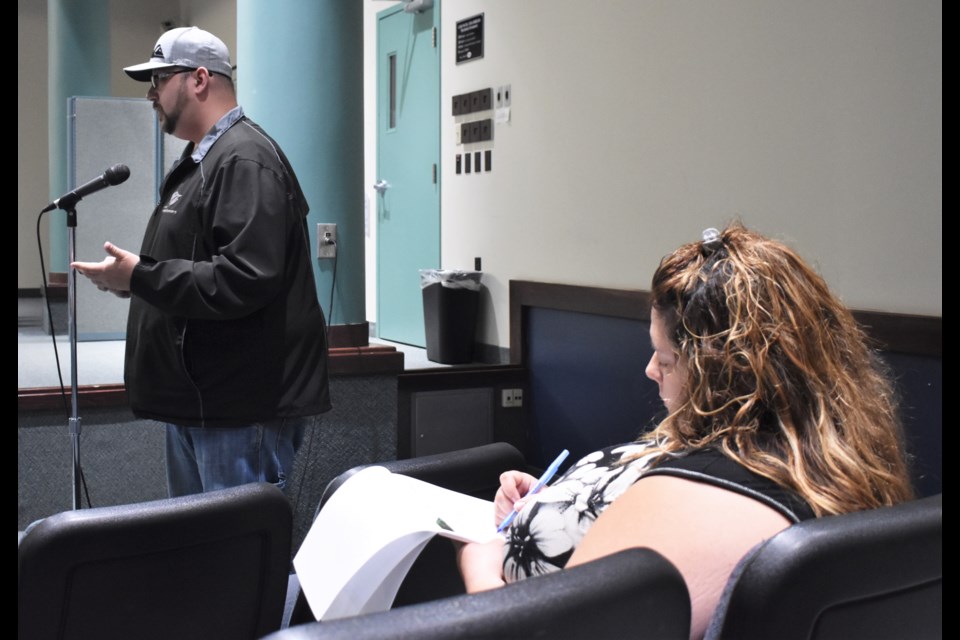The city’s attempt to “level the playing field” and to allow Uber to operate in the community could spell the demise of local taxi companies, lead to “grief” for riders and drive up costs.
That was the message from local cab companies at a public forum Tuesday night held to garner feedback on a draft by-law regarding the regulation of the ground transportation industry.
In April, Shawn Crawford, the city’s manager of legislative services, presented a 75-page report to city council that outlined proposed changes to rules and regulations surrounding taxicab companies, accompaniment services and ride-sharing services.
At the time, Crawford said the “fairly involved and complex” report is similar to a “consultation paper” meant to stimulate debate and garner feedback from the public and stakeholders.
At Tuesday's forum at city hall, Crawford provided an overview of the proposed bylaw to about two dozen attendees. Ward 1 Councillor Ted Emond moderated the meeting and was joined by his Ward 1 colleague, Sarah Valiquette-Thompson, city CAO Gayle Jackson and Jeff Rogers, a bylaw enforcement officer.
“I want to reiterate no decision has been made yet,” Valiquette Thompson said at the outset of the meeting. “Your input is invaluable to us as you’re the experts in your industry.”
The new bylaw has three primary components. One is a provision for ‘transportation network companies’ such as Uber, where the full transaction occurs through a phone ap.
“(Under the proposed rules) the company would be required to be licensed by the city and the drivers and the vehicles would be required to be registered by the city ... As part of those requirements, drivers would have to have criminal record checks and vehicles would require vehicle safety standards certificates,” said Crawford.
Uber proponent Derick Lehmann said 95% of the proposed new rules are already covered by Uber’s own regulations.
The second component of the new bylaw is focused on loosening the reins on the taxi industry. While the city would continue to regulate cab companies, some regulations would be removed “to level the playing field,” said Crawford.
For example, taxi companies would no longer be required to have a permanent office in Orillia, would not have to be open 24 hours a day/365 days a year and could set their own rates.
But local taxi companies scoffed at those changes.
Jennifer Denault, owner of Orillia Taxi Service, said the changes “don’t help us.” She said if they aren’t open, they can’t make money. She also said a physical office is important and necessary. “I’m not an ap,” she said.
Denault predicted allowing companies to set their own fares would “cause a war between the three companies … that will only cause grief within residents.” She said smaller companies, with less overhead and lower costs, could charge lower fares. She worried about safety and fairness.
John Beck, owner of Able Taxi, agreed. He said it would be impossible for the city to keep track of Uber drivers and warned they would “cherry-pick” the prime-time calls that would hurt local cab companies and, potentially, make it impossible for them to survive.
Beck said that would mean people who needed a ride in a snowstorm, on a holiday or in the middle of the night would be out of luck.
He said the city’s proposal related to hours and a permanent office are also off-track.
“We have to have an office because we have a sophisticated phone system,” he said, noting Able added a phone ap option about three years ago. He said “seniors will never use an ap to get a ride”, noting his company is proof of that.
While he understands the lure of Uber, he said the playing field is anything but level. “We paid all our dues for years, we do all the safety checks and then suddenly Uber comes in and we drop all these regulations and public safeguards,” said Beck. “I don’t get it. It just doesn’t make sense.”
What doesn’t make sense is waiting hours for a cab, said two downtown business owners.
Andre Legault, managing partner of Kensington Burger Bar, said he and his staff have often been forced to give patrons a ride home.
“Part of our social responsibility is to ensure no one is driving under the influence,” he said, noting patrons have, at times, waited hours for a cab. “Sometimes, there’s maybe two drivers on call and they’re out of town. How is that servicing people who pay taxes in Orillia?”
He suggested a taxi company is needed in Rama. Uber would help, he added. “We need to do something because a two-hour wait for a cab is unacceptable.”
Don Porter, owner of The Geneva, agreed.
“My main goal is to bring people downtown (for) a show,” said Porter. “At the end of the night, I can’t get them home. They won’t leave because there’s no cabs.”
He said it’s ironic that cab company owners are worried about Uber cherry picking. He said that’s exactly what cab companies are doing – choosing to earn more money by picking up a fare at the casino.
“If you want to be an Orillia city company, work in Orillia. If you want to be a casino company, go work at the casino,” he said. “I don’t care (if it’s) Uber or taxi …. all I want is a service in town so people can get a ride home. It’s simple.”
It may not be simple for council to decide on what will be included, ultimately, in the bylaw.
“It was great to hear this input … there’s lots for us to consider,” said Valiquette-Thompson, noting councillors are expected to deliberate on the matter at its June 18 council committee meeting.
The third component of the draft bylaw is related to ‘auxiliary service transportation companies.’ Helping Hands, Happy at Home and Going with Gibb are asking the city to remove this controversial component from the bylaw. (A separate story on this will be published later today).
